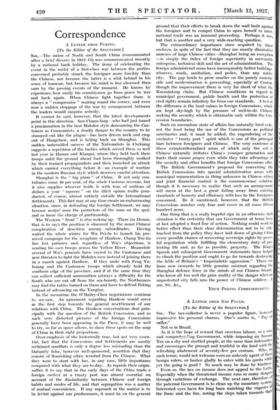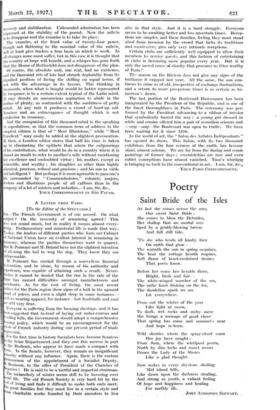A LETTER FROM SAO PAULO.
[To the Editor of the SPECTATOR' SIR,—The tax-collector is never a popular figure, howevo impressive his personal charms. One's motto is, "Pay sir snffer."
Not so in Brazil.
As it is the hope of reward that sweetens labour, so a wk and compreher.:ling Government, while imposing an Income Tai: on a shy and startled people, at the same time indemnitii and encourages the prompt and truthful in the land with the refreshing abatement of seventy-five per centum. Who, on such terms, would not welcome even an unlovely agent of tlic;i benign rulers, or hasten gladly to enter with his quota wild' yet the going is good ? So much may be done by kindnes•
Even so, the tax on income does not appeal to the Latin. Especially when the threatened income runs so many danger'. through variations of exchange. The next care, therefore, the paternal Government is,to clean up the monetary system Interested eyes have for long been watching the vagaries !I the franc and the lira, noting the steps taken tdwards their rceovery and stabilization. Unbounded admiration has been expressed at the stability of the pound. Now the milreis is to disappear and the cruzeiro is to take its place.
The eruzeiro, at the fixed value of twenty-four pence, though not flattering to the nominal value of the milreis, riil at least give traders a firm basis on which to work. In all changes some must suffer, but in this case it is thought that the country at large will benefit, and a whisper has gone forth that the House of Rothschild does not disapprove of the plan: Of course, the absolute unit, one real, had no existence, and the thousand reis of late had shrunk deplorably from its dignified position of facing the shilling on equal terms, if not with the advantage in its favour. This thinking in thousands, when what is bought would be better represented he twopence, is to a certain extent typical of the Latin mind. It may denote an unconscious aspiration to abide in the lealms of plenty, as contrasted with the sordidness of petty detail. At any rate it produces a crowd of hard-up mil- lionaires and an extravagance of thought which is not conducive to economy.
And the companion of this thousand-mind is the speaking in superlatives, so that the common term of address to the simplest citizen is that of "Most Illustrious," while "Most Excellent" may easily be added at the slightest provocation. If, then, a London editor states that half his time is taken up in eliminating the epithets that adorn the outpourings of his contributors, what would he do in a country where it is almost an insult to refer to another's wife without mentioning her excellence and undoubted virtue ; his mother, except as venerable, and worthy ; his daughter as other than highly educated, precious, refined and gracious ; and his son as virile and intelligent ? But perhaps it is more agreeable to pass one's life surrounded by " Commendadores," colonels, majors, doctors and illustrious people of all calibres than in the company of a lot of misters and nobodies.—I am, Sir, &e., Youn CORRESPONDENT IN SACI PAULO.































































 Previous page
Previous page